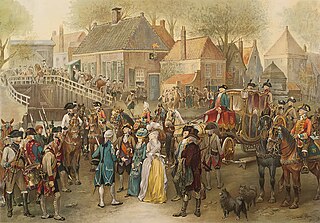
The Patriottentijd was a period of political instability in the Dutch Republic between approximately 1780 and 1787. Its name derives from the Patriots faction who opposed the rule of the stadtholder, William V, Prince of Orange, and his supporters who were known as Orangists. In 1781 one of the leaders of the Patriots, Joan Derk van der Capellen tot den Pol, influenced by the reformer Richard Price and the dissenter Joseph Priestley, anonymously published a pamphlet, entitled Aan het Volk van Nederland, in which he advocated, like Andrew Fletcher, the formation of civic militias on the Scottish, Swiss and American model to help restore the republican constitution.

The University of Franeker (1585–1811) was a university in Franeker, Friesland, the Netherlands. It was the second oldest university of the Netherlands, founded shortly after Leiden University.

Isaac Jan Alexander Gogel was a Dutch politician, who was the first minister of finance of the Batavian Republic and the Kingdom of Holland. He married Catharina van Hasselt in 1800, and had three children.

Nicolaas van Staphorst was a Dutch banker and financier. Nicolaas and Jacob van Staphorst were involved from 1782-1794 in a total of eleven loans to the United States with a value of 29 million guilders. Van Staphorst also invested with other Dutch investment houses in a series of ventures in the U.S. that developed into the Holland Land Company.

Adam Gerard Mappa was a Dutch type-founder, Patriot and active colonel in a local militia. In 1794 he became the agent for the Holland Land Company in New York (state) and three years later supervisor in the recently set up village of Barneveld.
Marguérite Emilie Luzac was a Dutch letter writer.

Pieter Paulus was a Dutch jurist, fiscal (prosecutor) of the Admiralty of the Maze and politician. He was one of the ideologues of the Dutch Patriot movement and is considered by many Dutch as the founder of their democracy and political unity.

Coert or Court Lambertus van Beyma, son of Julius Matthijs van Beyma and Fokel Helena van Burmania, was a public notary and auctioneer, delegate and representative of the Frisian States, and the radical leader of the Frisian patriots. He was the initiator of a Frisian coup and spent seven years in exile in north-western France. On his return to the Netherlands in 1795, he became a delegate to the National Assembly of the newly established Batavian Republic.

Gerrit Paape was a Dutch plateelschilder, poet, journalist, novelist, judge, columnist and ministerial civil servant.
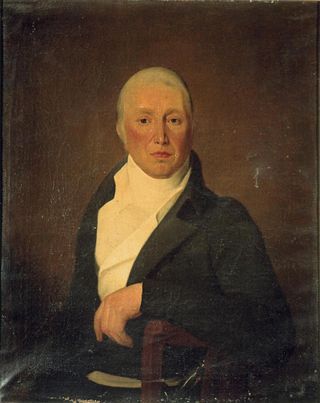
Wybo Fijnje was a Dutch Mennonite minister, publisher in Delft, Patriot, exile, coup perpetrator, politician and – during the Batavian Republic and Kingdom of Holland – manager of the predecessor of the Staatscourant.

Dr. Theodorus van Kooten was a Dutch poet, professor and politician.
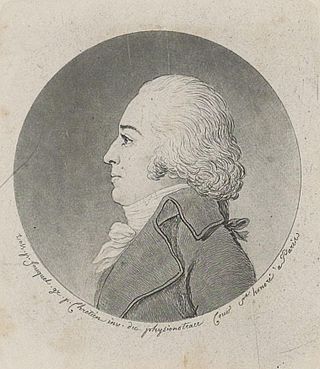
Pieter Philip Jurriaan Quint Ondaatje was an illustrious Dutch patriot and influential revolutionary politician at the end of the 18th century. Ondaatje is regarded as a pioneer of Dutch democracy. When Utrecht was besieged by States army troops he allied himself with Rhinegrave von Salm, entrusted with the defence Holland and Utrecht. At the end of 1787 he lived as refugee in Brussels and French Flanders. From 1795 he served the Batavian Republic and in 1806 the Kingdom of Holland. Up to the Hundred Days he worked in Paris.

The Batavian Revolution in Amsterdam refers to the transfer of power in the city of Amsterdam on 18 January 1795 to a Revolutionary Committee of the new Batavian Republic. The same day the stadtholder of the Dutch Republic, William V, Prince of Orange fled the country. Amsterdam was the first city that declared itself in the Batavian Revolution that brought about the Batavian Republic.
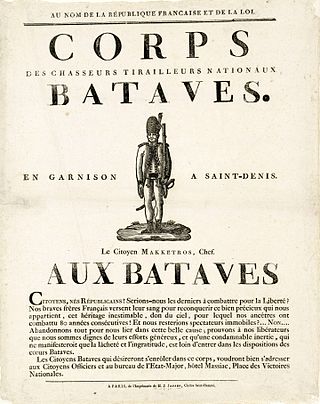
The Batavian Legion was a unit of Dutch volunteers under French command, created and dissolved in 1793.

Waadhoeke is a municipality of Friesland in the northern Netherlands. It was established 1 January 2018 and consists of the former municipalities of Franekeradeel, het Bildt, Menameradiel and parts of Littenseradiel, all four of which were dissolved on the same day.
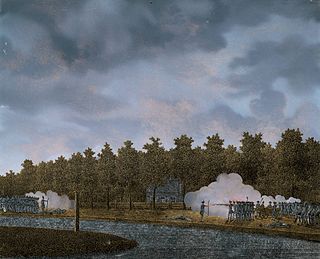
The Battle of Jutphaas, also known as the Battle of the Vaart or the Battle of Vreeswijk, occurred on 9 May 1787 on the banks of the Vaartsche Rijn canal near Jutphaas and Vreeswijk between Orangists and Patriots.

The Leiden Draft is the translation used in Anglophone historiography of the Dutch-language concept Leids Ontwerp, a draft-manifesto discussed by the Holland congress of representatives of exercitiegenootschappen on 8 October 1785 in Leiden in the context of the so-called Patriot revolution of 1785 in the Dutch Republic. This draft resulted in publication of the manifesto entitled Ontwerp om de Republiek door eene heilzaame Vereeniging van Belangen van Regent en Burger van Binnen Gelukkig en van Buiten Gedugt te maaken, Leiden, aangenomen bij besluit van de Provinciale Vergadering van de Gewapende Corpsen in Holland, op 4 oktober 1785 te Leiden. It contained an exposition of the Patriot ideology and arrived at the formulation of twenty proposals of political reform in a democratic vein.
Antoine Marie Cerisier was a French journalist, politician and historian, who played a role in the Patriot Revolution in the Dutch Republic in 1785–1787, after first having supported the cause of the American Revolution in that country in collaboration with American ambassador John Adams. Later he also played a role in the early years of the French Revolution as a collaborator of Mirabeau. In that capacity he published an extract of the Dutch Leiden Draft, a manifesto that may have influenced the French Declaration of the Rights of Man and of the Citizen.
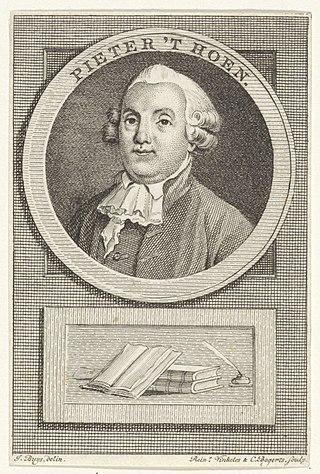
Pieter 't Hoen was a Dutch journalist, poet, and politician who played an important role during the Patriottentijd as the editor of De Post van den Neder-Rhijn.

Elie Luzac was a Dutch jurist, journalist, writer of philosophical, historical and political literature, and book-seller, who was considered an important ideologue of the "democratic wing" of the Orangist movement, both after the Orangist restoration in the Dutch Republic in 1748, and during the Patriottentijd.





















